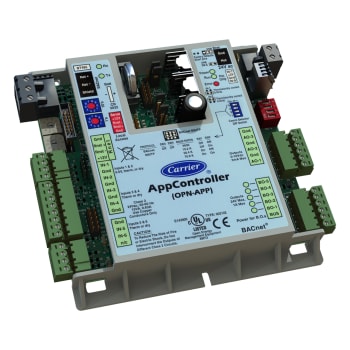i-Vu® General Purpose AppController
OPN-APP
General Purpose Controller
Programmable controller for utilizes a library of factory-engineered control programs for fan coils, unit ventilators, water source heat pumps and constant volume AHUs
The AppController continuously monitors and regulates equipment operation with reliability and precision. The AppController’s factory-engineered control programs provide optimum performance and energy efficiency for HVAC equipment such as fan coils, unit ventilators, water source heat pumps, and constant volume AHUs. It also features native BACnet communications and plug-and-play connectivity to the Carrier i-Vu Building Automation System.


Application Features
- Library of factory-engineered control programs for fan coils, unit ventilators, water source heat pumps, and constant volume AHUs
- Supports Snap graphical programming for creating customized control programs
- Supports Carrier communicating room sensors, which allow for local setpoint adjustment and local overrides
Hardware Features
- Battery-backed real time-clock keeps time in the event of power failure
- Stand-alone control of up to 14 I/O points using proven algorithms
- Native BACnet MS/TP communications
System Benefits
- Fully plug-and-play with the Carrier i-Vu Building Automation System
- Supports demand limiting for maximum energy savings
| BACNet Support | Advanced application controller (B-AAC), as defined in BACNet 135-2001 Annex L |
| Communication Ports | BACnet port: EIA-485 port for BACnet MS/TP communications (baud rates is DIP switch selectable)
Local Access port: For system start-up and troubleshooting (115.2 kbps) Rnet port: For connecting Carrier communicating room sensors and Carrier's touchscreen user interface |
| Inputs | 6 inputs: Configurable for thermistor or dry contact. Inputs 1 and 2 are also configurable for 0-5 VDC. Inputs 7 and 8 are not used. AIs have 10 bit A/D resolution. |
| Outputs | 5 binary outputs: Relay contacts rated at 1A max @ 24 VAC/VDC, configured normally open.
3 analog outputs: Rated at 0-10VDC, 5mA max, with 8 bit D/A resolution using filtered PWM. |
| Protection | Incoming power and network connections are protected by non-replaceable internal solidstate polyswitches that reset themselves when the condition that causes a fault returns to normal. The power, network, input, and output connections are also protected against voltage transient and surge events.. |
| Real Time Clock | Battery-backed real time clock keeps track of time in event of power failure |
| Battery | 10-year Lithium CR2032 battery provides a minimum of 10,000 hours of trend data & time retention during power outages. |
| Status Indicators | LED status indicators for communications, run status, error, power, and all digital outputs. |
| Controller Addressing | Rotary DIP switches set BACnet MS/TP MAC address of controller. |
| Listed By | UL-916 (PAZX), cUL-916 (PAZX7), FCC Part 15-Subpart B-Class A, CE EN50082-1997 |
| Environmental Operating Range | Operating: 0° to 140°F (-18° to 54°C), 10-90% relative humidity, non-condensing
Storage: -24°F to 140°F (-30° to 60°C), 10-90% relative humidity, non-condensing |
| Power Requirements | 24VAC +/- 10%, 50-60Hz
18VA power consumption 26VDC (25V min, 30V max Single Class 2 source only, 100VA or less |
| Dimensions | Length: 5-5/8” (14.31 cm)
Width: 5-1/8” (13 cm) Depth: 2” (5.1 cm) Weight: 0.44 lbs. (0.20 kg) |
Application Features
- Library of factory-engineered control programs for fan coils, unit ventilators, water source heat pumps, and constant volume AHUs
- Supports Snap graphical programming for creating customized control programs
- Supports Carrier communicating room sensors, which allow for local setpoint adjustment and local overrides
Hardware Features
- Battery-backed real time-clock keeps time in the event of power failure
- Stand-alone control of up to 14 I/O points using proven algorithms
- Native BACnet MS/TP communications
System Benefits
- Fully plug-and-play with the Carrier i-Vu Building Automation System
- Supports demand limiting for maximum energy savings
| BACNet Support | Advanced application controller (B-AAC), as defined in BACNet 135-2001 Annex L |
| Communication Ports | BACnet port: EIA-485 port for BACnet MS/TP communications (baud rates is DIP switch selectable)
Local Access port: For system start-up and troubleshooting (115.2 kbps) Rnet port: For connecting Carrier communicating room sensors and Carrier's touchscreen user interface |
| Inputs | 6 inputs: Configurable for thermistor or dry contact. Inputs 1 and 2 are also configurable for 0-5 VDC. Inputs 7 and 8 are not used. AIs have 10 bit A/D resolution. |
| Outputs | 5 binary outputs: Relay contacts rated at 1A max @ 24 VAC/VDC, configured normally open.
3 analog outputs: Rated at 0-10VDC, 5mA max, with 8 bit D/A resolution using filtered PWM. |
| Protection | Incoming power and network connections are protected by non-replaceable internal solidstate polyswitches that reset themselves when the condition that causes a fault returns to normal. The power, network, input, and output connections are also protected against voltage transient and surge events.. |
| Real Time Clock | Battery-backed real time clock keeps track of time in event of power failure |
| Battery | 10-year Lithium CR2032 battery provides a minimum of 10,000 hours of trend data & time retention during power outages. |
| Status Indicators | LED status indicators for communications, run status, error, power, and all digital outputs. |
| Controller Addressing | Rotary DIP switches set BACnet MS/TP MAC address of controller. |
| Listed By | UL-916 (PAZX), cUL-916 (PAZX7), FCC Part 15-Subpart B-Class A, CE EN50082-1997 |
| Environmental Operating Range | Operating: 0° to 140°F (-18° to 54°C), 10-90% relative humidity, non-condensing
Storage: -24°F to 140°F (-30° to 60°C), 10-90% relative humidity, non-condensing |
| Power Requirements | 24VAC +/- 10%, 50-60Hz
18VA power consumption 26VDC (25V min, 30V max Single Class 2 source only, 100VA or less |
| Dimensions | Length: 5-5/8” (14.31 cm)
Width: 5-1/8” (13 cm) Depth: 2” (5.1 cm) Weight: 0.44 lbs. (0.20 kg) |
California residents please see Proposition 65


